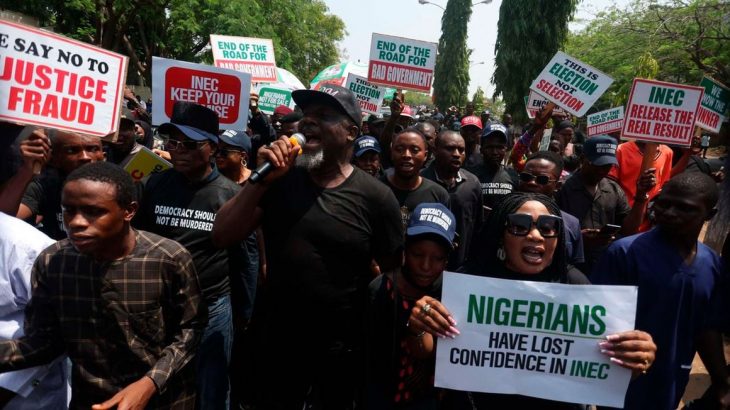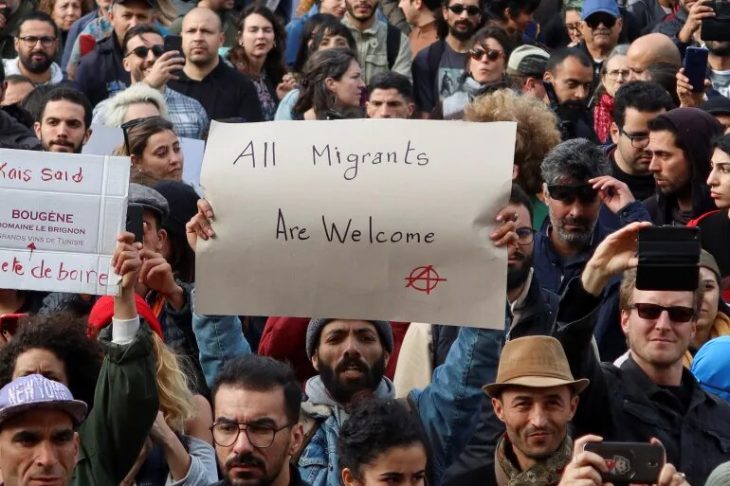Opposition parties in four African countries have today March 20, 2023, staged huge mass demonstrations against the governments in their respective countries.
South Africa, Kenya, Tunisia and Nigeria have been hit by waves of anti-government protests as opposition supporters staged demos to express dissatisfaction with the respective administrations in dealing with economic and political problems.
Kenya
In Kenya, opposition leader Raila Odinga called for mass action after the government failed to heed his demands.

Raila listed six reasons why he asked his supporters to take to the streets to demonstrate; including President Ruto William Ruto’s refusal to allow the audit of the Independent Electoral and Boundaries Commission (IEBC) servers and to lower the high cost of living.
Other reasons include nepotism in the current administration, lack of consultations in the reconstitution of IEBC, broken promises and an illegitimate government.
Police have today arrested several opposition supporters who took to the streets of the capital Nairobi and other cities across the country to demonstrate against the government
Now or Never !#NationalShutdown pic.twitter.com/g9C34Sol32
— EFF Gauteng (@EFFGautengProv) March 19, 2023
Nigeria
Africa’s most populous nation has been hit by a series of protests since following February 25, 2023, Presidential and National Assembly elections that saw the All-Progressives Congress (APC) presidential candidate Bola Tinubu declared winner in the tightly contested poll.
Tinubu’s closest rival and Nigeria’s opposition leader Atiku Abubakar, who came second, has led street protests with his supporters in tow-disputing the election results.
With Tinubu set to take over from President Muhammadu Buhari on May 29, 2023, the opposition parties among them APC and Peter Obi’s Labor Party, have accused the country’s electoral body- the Independent National Electoral Commission (INEC)- of overseeing an exercise marred with massive vote-rigging.
Nigerians have also been protesting against fuel shortage and currency swapping difficulties. A Supreme Court ruling last month ordered the government to delay phasing out old currencies to December 31.

Tunisia
Anti-government demonstrations also happened in Tunisia on March 20 as the nation observes its Independence Day holiday. The day commemorates Tunisia’s independence from France in 1956 and is often an occasion for major rallies and anti-government protests.
Thousands of people have participated in demonstrations organized by the Free Destourian Party in Tunis in opposition to President Kais Saied’s policies and constitutional amendments in recent weeks.
The Free Destourian Party in Tunis is headlining the demonstrations against President Kais Saied’s dissolution of parliament. They also accuse him of planning to silently amend the Constitution.
The cost of living, insecurity and impunity have also angered the public in Tunisia. Activists were organising a massive protest on Friday to be continued daily until Monday.

According to protests tracker Crisis 24, organisers from the National Salvation Front group planned to protest outside the Municipal Theatre in Tunis every afternoon to force a response from President Kais Saied who is accused of worsening the economic well-being of people.
The Tunisian president has in the recent past accused African migrants of being part of a conspiracy to change Tunisia’s demographic makeup amid a crackdown on migrants, sparking criticism by human rights groups.


